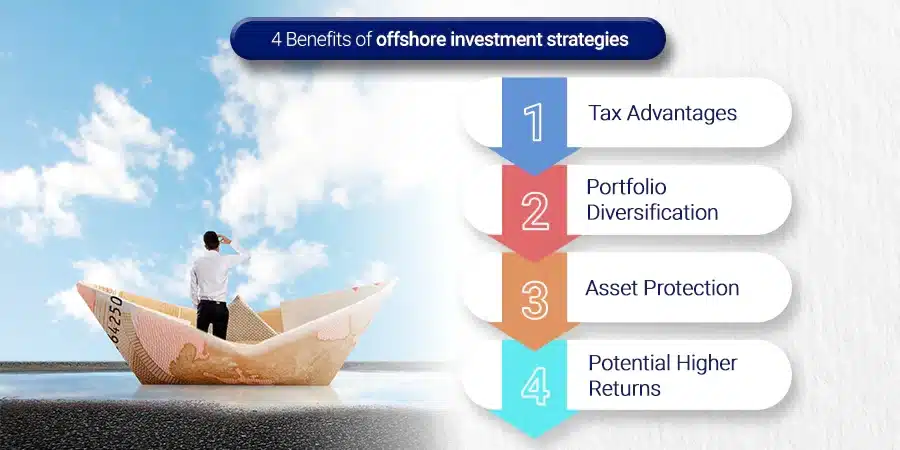How Offshore Investment Can Assist You Shield Assets from Economic Instability
How Offshore Investment Can Assist You Shield Assets from Economic Instability
Blog Article
How Offshore Investment Functions: A Step-by-Step Breakdown for Capitalists
Offshore financial investment provides a structured path for capitalists seeking to optimize their financial approaches while leveraging international chances. The process starts with the cautious selection of a jurisdiction that straightens with a financier's goals, adhered to by the facility of an account with a qualified overseas institution.

Recognizing Offshore Investment
Understanding offshore financial investment includes identifying the tactical benefits it provides to people and corporations seeking to maximize their financial profiles. Offshore financial investments usually describe assets kept in an international jurisdiction, commonly characterized by positive tax obligation regimes, regulative settings, and privacy securities. The key intention behind such investments is to improve resources diversity, growth, and danger monitoring.

Investors can access a broad range of monetary instruments with overseas locations, consisting of supplies, bonds, shared funds, and property. These investments are frequently structured to comply with regional legislations while offering versatility in terms of asset allotment. Additionally, offshore investment strategies can make it possible for people and organizations to hedge against domestic market volatility and geopolitical risks.
Another trick facet of overseas investment is the potential for enhanced personal privacy. Lots of offshore jurisdictions have strict discretion legislations, which can safeguard an investor's financial details from public disclosure. Nevertheless, it is important for investors to remain compliant with their home nation's tax regulations and coverage demands, as non-compliance can result in extreme charges. As a result, a comprehensive understanding of both the obligations and advantages related to overseas investments is essential for notified decision-making.
Benefits of Offshore Spending
Capitalists frequently turn to offshore spending for its countless advantages, including tax obligation performance, asset security, and profile diversity. Among the primary benefits is the capacity for tax obligation optimization. Several overseas jurisdictions provide positive tax obligation regimens, allowing investors to lawfully minimize their tax obligation responsibilities and take full advantage of returns on their financial investments.
In addition, overseas accounts can provide a layer of asset protection. Offshore Investment. By putting possessions in politically steady jurisdictions with strong privacy legislations, financiers can secure their riches from possible lawful insurance claims, lenders, or economic instability in their home countries. This type of security is especially appealing to high-net-worth individuals and entrepreneurs facing lawsuits threats
In addition, overseas investing assists in profile diversification. Accessing international markets allows investors to discover possibilities in various property courses, including realty, stocks, and bonds, which might not be readily available locally. This diversification can reduce overall profile danger and improve potential returns.
Ultimately, the advantages of offshore investing are engaging for those seeking to optimize their monetary techniques. It is vital for capitalists to thoroughly comprehend the laws and implications linked with offshore financial investments to ensure compliance and attain their financial objectives.
Picking the Right Jurisdiction
Picking the appropriate jurisdiction for overseas investing is a vital choice that can significantly affect a capitalist's financial method. The appropriate jurisdiction can offer numerous benefits, including beneficial tax obligation frameworks, asset security legislations, and governing environments that align with a financier's objectives.
When picking a territory, consider elements such as the political stability and financial wellness of the Going Here nation, as these components can affect investment safety and security and returns. Moreover, the lawful structure bordering international financial investments need to be evaluated to guarantee compliance and protection of assets. Countries known for durable lawful systems and openness, like Singapore or Switzerland, usually infuse better self-confidence amongst financiers.
Furthermore, evaluate the tax implications of the jurisdiction. Some nations supply eye-catching tax rewards, while others may impose rigorous coverage demands. Comprehending these nuances can aid in maximizing tax obligation obligations.

Actions to Establish Up an Offshore Account
Developing an offshore account includes a series of methodical actions that ensure conformity and security. The very first action is selecting a credible offshore banks, which should be certified and managed in its jurisdiction. Conduct extensive study to assess the organization's credibility, services used, and consumer reviews.
Next, gather the needed documents, which generally includes recognition, evidence of address, and details regarding the source of funds. Different jurisdictions may have differing needs, so it is crucial to confirm what is needed.
When the paperwork is prepared, initiate the application process. This might entail submitting kinds online or personally, depending on the establishment's procedures. Be gotten ready for a due persistance procedure where the financial institution will certainly verify your identity and assess any potential risks associated with your account.
After approval, you will receive your account information, permitting you to money your overseas account. It is suggested to keep clear documents of all deals and follow tax policies in your home nation. Developing the account appropriately establishes the foundation for effective overseas financial investment monitoring in the future.
Handling and Monitoring Your Investments
Once an overseas account is efficiently established, the focus shifts to taking care of and checking your investments effectively. This crucial stage entails a methodical method to guarantee your properties line up with your financial objectives and best site run the risk of tolerance.
Begin by developing a clear financial investment technique that details your goals, whether they are prime conservation, earnings generation, or growth. Regularly assess your portfolio's efficiency versus these benchmarks to analyze whether modifications are required. Using financial monitoring tools and systems can help with real-time monitoring of your investments, giving insights right into market trends and property allotment.
Involving with your offshore economic advisor is crucial. They can provide expertise and support, helping you navigate intricate international markets and governing environments. Arrange periodic evaluations to review performance, evaluate market problems, and recalibrate your technique as essential.
Additionally, stay educated about geopolitical advancements and financial indications article source that may affect your financial investments. This aggressive approach enables you to react without delay to changing situations, ensuring your overseas profile continues to be durable and straightened with your financial investment goals. Ultimately, persistent administration and recurring surveillance are necessary for making the most of the benefits of your offshore financial investment method.
Verdict
In conclusion, overseas financial investment offers a strategic method for portfolio diversification and risk administration. Proceeded tracking and partnership with financial experts stay important for keeping an active investment strategy in an ever-evolving international landscape.
Offshore investment offers a structured path for financiers looking for to enhance their financial methods while leveraging global possibilities.Comprehending overseas investment entails recognizing the critical advantages it supplies to corporations and people seeking to enhance their economic portfolios. Offshore financial investments generally refer to properties held in a foreign jurisdiction, often defined by desirable tax routines, governing atmospheres, and personal privacy protections. Furthermore, overseas financial investment techniques can make it possible for individuals and companies to hedge versus domestic market volatility and geopolitical risks.

Report this page